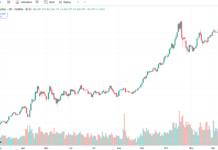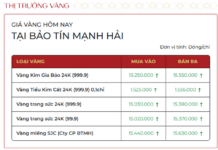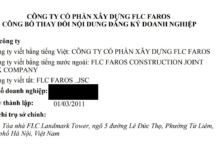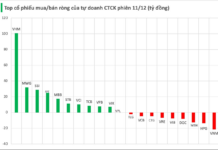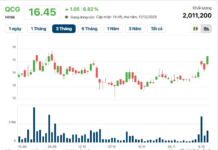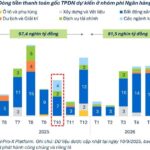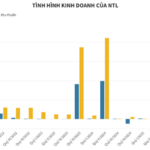Mr. Nguyen Quang Huy, CEO of the Finance and Banking Department at Nguyen Trai University, suggests that in the short term, the new regulation may cause a temporary slowdown in the market, particularly in the primary segment and projects in early fundraising stages. Some short-term leveraged investors will face reduced opportunities, with a slight decrease in liquidity.
However, in the medium to long term, this is a necessary filtering process: credit capital will be directed towards genuine buyers and projects, improving the quality of bank collateral and strengthening market confidence on a more transparent and stable foundation.
If implemented harmoniously, with clear guidelines, transparent locking mechanisms, and standardized risk control procedures, this policy will not obstruct capital flow but instead create a safer operational framework for banks, businesses, and buyers. Consequently, the real estate market can transition from “leverage-driven growth” to “development based on real financial capacity and asset value.”
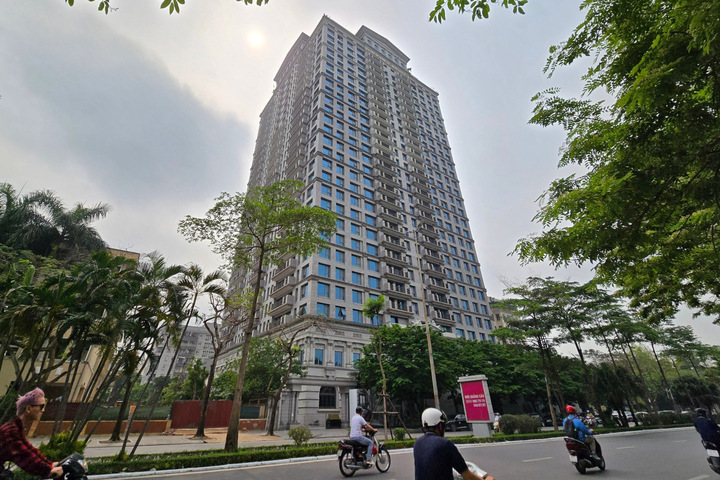
Tightening real estate deposit loans: The market will be filtered. (Illustrative image: Minh Duc)
Mr. Huy further analyzes that the State Bank’s Zone 2 directive requiring banks to halt lending for deposit payments based on “agreement documents” (or similar forms) when purchasing real estate is a strategic credit regulation measure. It reflects the regulator’s cautious approach in managing risks and redirecting capital toward sustainable development goals.
Essentially, this is not an extreme tightening measure but a necessary adjustment to ensure the safety of the financial and banking system, while reinstating discipline in the real estate market after a period of overheated growth and widespread leverage.
In standard real estate credit practices, banks typically lend only 50-70% of the asset’s appraised value and disburse funds only after the buyer has contributed their equity portion. However, recently, some buyers have been borrowing to pay deposits for properties that are not yet legally established, existing only as reservation agreements or preliminary deposit contracts.
In such cases, banks disburse funds based on “agreement documents” lacking clear legal grounds, exposing credit capital to high-risk areas prone to disputes and bad debts.
Moreover, deposit lending inadvertently fuels speculative activities, as some investors use the same capital to place deposits on multiple properties, anticipating further bank disbursements based on ratios.
This leverage cycle creates inflated investment demand, driving up prices and disrupting the supply-demand balance, leading to overheated market conditions. When trends reverse, leveraged transactions withdraw rapidly, increasing the risk of deposit forfeitures, payment halts, and pressure on developers, thereby elevating credit system risks.
In this context, halting deposit lending can be seen as a prudent preventive measure, helping the market return to a healthy financial trajectory. This policy aims to protect genuine homebuyers, ensuring transactions adhere to standard legal frameworks: credit is extended and disbursed only when projects meet sales conditions, assets are transparently valued, and buyers contribute their equity portion. This encourages buyers to make more informed decisions, reducing the risk of engaging with legally incomplete projects or complex contracts.
Sharing the same view, Mr. Le Hoang Chau, Chairman of the Ho Chi Minh City Real Estate Association (HoREA), believes that prohibiting credit institutions from lending for deposits on future transactions that do not yet meet conditions at the time of deposit is essential.
“In cases of illegal land subdivision or apartment projects without completed foundations or legal capital mobilization conditions, buyers will not be able to borrow for deposits. This protects the legitimate rights and interests of buyers of future real estate and housing, contributing to a healthy market,” Mr. Le Hoang Chau stated.
Mr. Giang Anh Tuan, Director of Tuan Anh Real Estate, also supports the new requirement, as it will filter the market and reduce risks for both banks and borrowers. Mr. Tuan added that developers without legal approval for sales must rely on deposits, so tightening lending will eliminate financially weak developers.
Additionally, buyers borrowing at the deposit stage often have limited financial capacity, acting as speculators with “no capital.” Restricting deposit lending may reduce speculative buyers, benefiting genuine homebuyers and increasing their chances of ownership.
According to him, this requirement aims to closely monitor borrowers’ capital use and manage credit risks.
For projects meeting legal conditions at the time of deposit, credit institutions will continue to lend for future transactions as usual. Therefore, this is not a capital tightening measure, and the real estate market will remain largely unaffected.
Law-abiding real estate businesses will not be impacted, as projects meeting capital mobilization conditions will still allow buyers to borrow for deposits.

Homebuyers will face reduced risks. (Illustrative image: Minh Duc)
Previously, economist Dr. Dinh The Hien commented that banks inherently manage risks and typically lend based on transaction merits. Given that initial deposits are small, if buyers cannot afford them, banks would not lend.
Deposit forfeitures and incomplete legal procedures are common, making such loans highly risky and prone to becoming bad debts for banks.
He added that early-stage investments like deposits or capital contributions do not warrant bank lending. Similar to financial proof requirements for study abroad or business establishment guarantees, bank lending in these cases undermines the purpose of financial verification.
Thus, this measure is necessary to enhance safety in the banking system without affecting overall lending activities or the real estate market.
Is the Real Estate Price Control and Restraint Policy Sufficient?
The objective of this article is to analyze international experiences in designing and implementing macroprudential policies for the housing market, extracting viable and contextually relevant policy lessons applicable to Vietnam. By examining these insights, the aim is to enhance financial stability and ensure that real estate price fluctuations align with the fundamental economic factors driving the Vietnamese economy.
₫6.8 Trillion in Real Estate Bonds Maturing in October, Led by Vinhomes, Phu My Hung, and Cen Land
According to FiinRatings, in October 2025, real estate companies are set to face a significant bond maturity milestone, with approximately VND 6.8 trillion in bonds due. This substantial figure is predominantly concentrated among industry leaders such as Vinhomes, Phu My Hung, and Cen Land.
Spectacular Turnaround: Real Estate Firm Escapes Losses Through Strategic Stock Market Investments as Property Sector Stalls
In Q3/2025, Lideco recorded nearly VND 58 billion in financial activity revenue, entirely from deposit interest and securities investment. This propelled the company to report a post-tax profit of nearly VND 13 billion, a 3.5-fold increase year-over-year.






